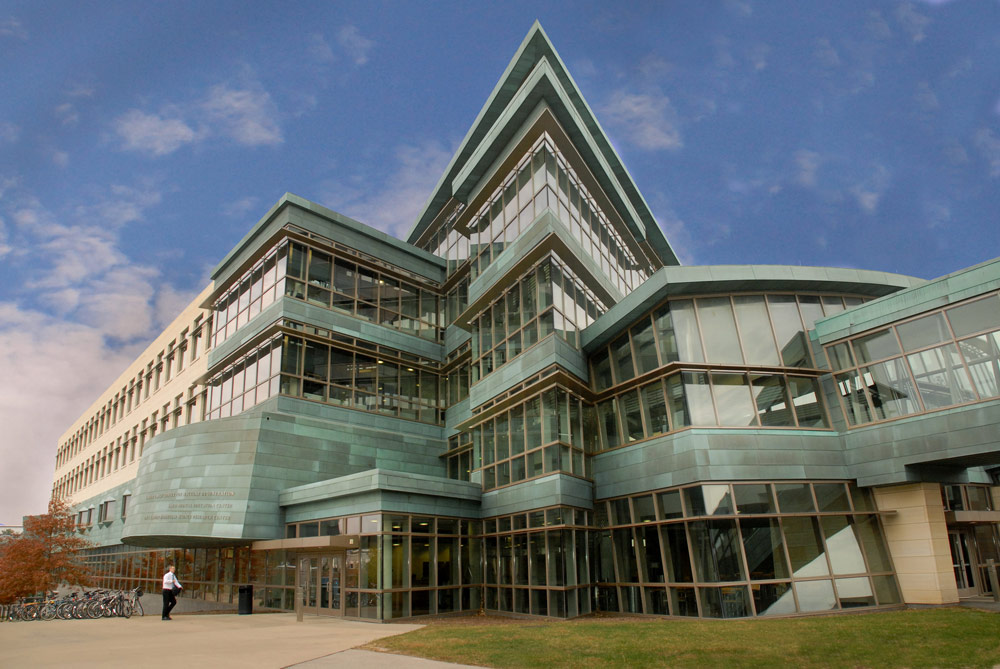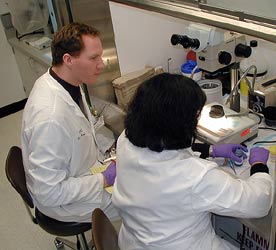Research Laboratories for Ophthalmology and Visual Sciences
The Carver College of Medicine is internationally recognized for its excellence and leadership in biomedical research. Among public medical schools, the College of Medicine ranks 11th in NIH funding in both the number of grants and total grant dollars per research faculty in public medical schools. University of Iowa Institute for Vision Research continues to garner funding for its ground-breaking research.
Carver College of Medicine faculty have been awarded approximately half of the University's total research funding and more than 80 percent of its National Institutes of Health funding. The University of Iowa is at the forefront among research universities in this country, and its contribution has been nationally recognized by such eminent authorities as the Carnegie Foundation, which classified The University of Iowa as having "very high research activity" among research universities.

The Laboratory for Disease Gene Discovery (LDGD), directed by Val C. Shefffield, MD, PhD, has as its primary goal the identification and characterization of genes involved in hereditary human disease with special emphasis placed on the study of hereditary retinopathies including age-related macular degeneration. The main strategies used by the laboratory are the use of genetic mapping methods and genomic resources to identify disease genes based on their position within the genome and/or putative function. The LDGD has developed thousands of highly polymorphic human genetic markers and novel genetic mapping methods to aid in the efficient mapping of disease loci. In collaboration with the MOL, the LDGD has succeeded in the mapping of over thirty human disease loci, and the identification of ten disease-causing genes including genes involved in glaucoma, macular degeneration and syndromic retinopathies (Bardet-Biedl Syndrome).
The Chorioretinal Degenerations Laboratory is directed by Rob Mullins, PhD. The major focus of this laboratory is to understand the cellular and molecular basis of macular diseases, including age-related macular degeneration (AMD), central serous retinopathy and Best vitelliform macular degeneration.
The laboratory is exploring the role of the choroid in the development of AMD and other diseases. It is also looking at the pathogenesis of other macular diseases including Best disease, Bardet-Biedl syndrome, Leber congenital amaurosis, retinitis pigmentosa, uveitis, and other acquired and inherited diseases of the retina. It utilizes animal models, human donor eyes, cell culture approaches, biochemical methods and genetic resources unique to the Carver Family Center for Macular Degeneration to approach this problem.
Research in Gene Therapy for eye diseases is under the auspices of Ian C. Han, MD, Stephen R. Russell, MD, Arlene V. Drack, MD, Elliott H. Sohn, MD, and Edwin Stone, MD, PhD. The University of Iowa is a leader in finding genetic causes of common and uncommon eye diseases such as Leber congenital amaurosis (LCA). Under the Carver Family Center for Macular Degeneration in the Department of Ophthalmology Institute for Vision Research, Drs. Russell, Drack, and Sohn are collaborating with pioneer gene therapists at the Children’s Hospital of Philadelphia to treat children blind from birth with Leber’s congenital amaurosis. In addition Drs Drack, Russell, Sohn and Stone are investigating gene replacement therapies and gene directed therapies in mice and pigs for other inherited retinal conditions.
Stem Cell Research for retinal, eye and related diseases is directed by Budd Tucker, PhD. New to the UI in 2010, Dr. Tucker’s research on combining state-of-the-art patient-specific stem cell and biodegradable tissue engineering technologies for the treatment of blinding retinal degenerative diseases has earned a 2010 National Institutes of Health Director's New Innovator Award.
Computer-Aided Diagnosis. Dr. Michael Abramoff and coworkers have established large retinal imaging networks in the Midwest of the United States and the Netherlands, with widespread networks of retinal cameras connected through the internet to the University of Iowa, for screening of diabetic retinopathy. The research combines clinical ophthalmology, visual neuroscience and bioinformatics to study the phenotypes and genotypes of diabetic retinopathy, age related macular degeneration and glaucoma.
Many of our faculty are investigators for the Center for the Prevention and Treatment of Visual Loss at the Iowa City Veterans Administration Medical Center. Investigators: Randy Kardon, MD, PhD; Michael D. Abramoff, MD, PhD; Chris A. Johnson, PhD; Markus Kuehn, PhD; Young H. Kwon, MD, PhD; Thomas A. Oetting, MD; Milan Sonka, PhD; Michael Wall, MD.
See additional information at UI Institute for Vision Research. The institute supports and coordinates the vision research activities of nine existing research units at the University of Iowa.
 Ophthalmology Diagnostic Laboratories
Ophthalmology Diagnostic Laboratories
The Frederick C. Blodi Ocular Pathology Laboratory occupies approximately 1,350 square feet in the UI Carver College of Medicine. A major renovation of this space was completed in 2001. Dr. Nasreen Syed joined the department as the laboratory director in September 2002. The lab serves as a national reference center and has up-to-date tissue processing equipment and computers to meet the needs of the most advanced anatomic pathology laboratory. One full-time histotechnologist staffs the laboratory.
The mission of The Carver Family Center for Macular Degeneration at University of Iowa is to cure inherited forms of blindness through the practical application of molecular biology. One can envision the process toward a cure as a serious of steps that begin with disease gene discovery, proceeds through investigations of animal models and affected patients, and ends with successful clinical trials of novel therapies.
The Molecular Ophthalmology Laboratory and The John and Marcia Carver Nonprofit Genetic Testing Laboratory occupy about 5,000 square feet in the Medical Education Research Facility. A vast array of techniques in molecular biology including DNA extraction, linkage analysis, single strand conformation polymorphism analysis, cloning and sequencing DNA, and polymerase chain reaction can be performed within the facility.
The John and Marcia Carver Nonprofit Genetic Testing Laboratory is dedicated to providing non-profit genetic testing for rare eye diseases to meet a societal need.